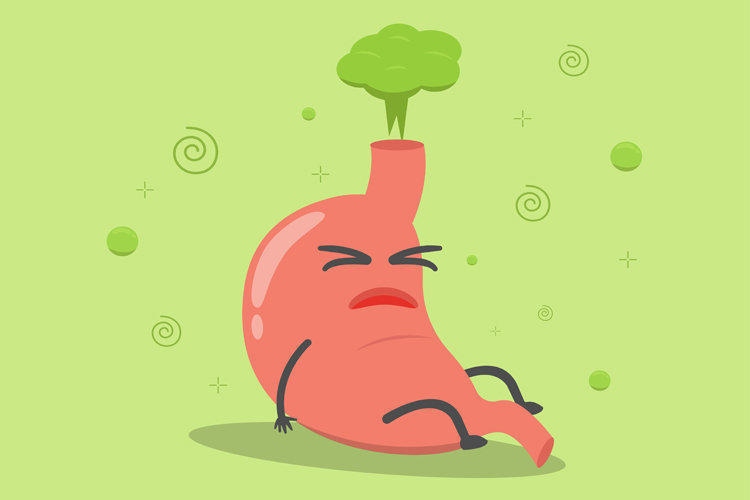Belching is a fairly common phenomenon, and many people even tend to ignore it. However, at a certain frequency and in combination with some symptoms, this phenomenon begins to bother a person. What is it, what happens and can the exit of air from the stomach speak about any serious diseases?
- Description of the phenomenon
- Causes of air burp
- Why does belching have a different taste and smell?
- Gastroesophageal Reflux Disease
- Gastritis
- Gastric ulcer
- Malignant tumors of the stomach
- Esophagus Pathologies
- Aperture Pathologies
- Duodenal-gastric reflux
- Supraventricular Burp
- Diagnose Causes
- Treatment
Description of the phenomenon
As you know, the lungs are far from the only internal organ of a person filled with air. And there is air in the stomach, and normally its volume there is large enough (up to 1.5 liters). This is due to the fact that the stomach is not isolated hermetically from the outside world. The presence of air inside the stomach provides optimal pressure inside the body.
The air contained in the stomach can be removed from it in several ways. First, through the esophagus (from which the belching occurs). Part of the air can pass through the intestines and out through the anus. And a part is absorbed through the intestinal wall.
Causes of air burp
To understand why there is such a phenomenon, it is necessary to consider the principle of the digestive system. When food enters the body, it passes through the esophagus and into the stomach. If there is a lot of food, then part of the air from the stomach comes out. This phenomenon is not pathological and indicates the normal motility of the gastrointestinal tract. Therefore, if a person after a hearty meal feels several episodes of belching air without odor, then this is not a cause for concern.
In some cases, belching may occur after intense exercise, in which there is a sharp shift in the contents of the stomach, and part of the air in it comes out. Often the occurrence of belching is affected by the wearing of tight belts or tight clothing. This circumstance does not allow the stomach to expand when filled, and therefore excess air from it tends to go outside. Especially this phenomenon is typical for obese people. But all this usually happens a short time after eating.
In the cases described above, the burping of air has a single character. However, sometimes a person is tormented by frequent belching. Reasons to install it can sometimes be difficult.
Quite often, air burping occurs in pregnant women, especially in the late months of pregnancy. This feature is not a pathology, because of natural causes. The fact is that during pregnancy, the uterus increases in size, puts pressure on the diaphragm and also pushes air out of the stomach.
It is quite another thing if belching occurs too often, for no apparent reason and, in addition, belching occurs on an empty stomach, that is, it has nothing to do with food intake. This is a reason to guard. And even more should be disturbed by the symptom, in which the belching is accompanied by the smell of rotten eggs, the release of sour or bitter contents into the mouth area. If you are tortured by this phenomenon, which recurs regularly, then this most likely indicates some pathologies of the gastrointestinal tract.
However, in some cases, such factors as unhealthy diet or eating habits can influence involuntary rygany. The phenomenon of aerophagia, that is, literally, the ingestion of air, is well known. This phenomenon can occur if a person eats quickly and swallows food without chewing it carefully, eating on the go. Talking during a meal, wearing improperly selected dentures, chewing gum, smoking, deep breathing, and frequent inhalation in the treatment of respiratory diseases can also lead to aerophagia. When this air in the stomach becomes too much, and he returns back through the esophagus.
Also some products can provoke belching. First of all, this refers to carbonated drinks . After all, it is well known that they contain inside a lot of dissolved carbon dioxide, which, once in the stomach, will tend to get out. Increased flatulence in the stomach and stimulate many other products, such as legumes, fatty foods, onions and garlic, strong tea and coffee. In this case, it is enough to eliminate these products from the diet and the unpleasant symptom will disappear by itself.
However, severe belching with air is rarely a completely distinct symptom. Quite often, an air burp in an adult is accompanied by other unpleasant phenomena:
- heartburn,
- weight in the stomach,
- nausea,
- pain in the stomach (in the epigastric region).
In this case, belching can be a symptom of various diseases of the gastrointestinal tract:
- gastritis (atrophic and non-atrophic),
- ulcers,
- pancreatitis,
- gastroduodenitis and duodenitis,
- cholecystitis,
- esophageal inflammation,
- hiatal hernia,
- weakness of the lower esophageal sphincter,
- injuries and burns of the stomach and esophagus,
- gastroesophageal reflux disease (GERD),
- oncological diseases.
Why does belching have a different taste and smell?
It is worthwhile to dwell on the causes of an eructation that has a bitter and sour taste, as well as an eructation with a rotten smell. Sour taste is usually caused by gastric juice thrown into the esophagus. This syndrome can often be found with reflux disease, gastric ulcer and gastritis.
The bitter taste in most cases indicates the ingestion of bile into the esophagus. As you know, bile is formed in the liver, and then through the system of special ducts enters the duodenum. Thus, the taste of bitterness indicates that the contents of the duodenum were alternately injected into the stomach, and then into the esophagus. Such a syndrome can be observed at noreferrer “> pancreatitis , cholecystitis, biliary dyskinesia.
The most unpleasant symptom is the putrid smell of regurgitating air. If bad breath due to the stomach is repeated regularly, then this indicates the insufficiency of the functions of this organ. The fact is that the putrid odor (the smell of rotten eggs) usually indicates the production of hydrogen sulfide in the stomach, bacteria there during fermentation processes. And this, in turn, suggests that the acidity of gastric juice is quite low, because otherwise the bacteria in large numbers there simply could not exist. This circumstance can be caused by various diseases, the most common of which is atrophic gastritis. This disease is characterized by the degradation of the tissues of the gastric mucosa and a decrease in the volume of the glands that generate juice. Also, the air outlet may be due to scleroderma of the esophageal mucosa.

Gastroesophageal Reflux Disease
This disease is one of the most common causes of air burping. It is due to the fact that the sphincter, located on the border between the esophagus and the stomach, is not fully closed. Because of this, there is a frequent casting of stomach contents into the esophagus, and then into the throat. As a result, heartburn appears. This is the name of a strong burning sensation in the esophagus. This happens due to the fact that gastric juice contains hydrochloric acid and has a high acidity, while the mucous membrane of the esophagus is sensitive to an acidic environment. Especially often this phenomenon occurs when a person leans or changes position of the body, lies for a long time.
GERD is not characterized by burping alone. Also, when the disease may be the following symptoms:
- pain in the chest or in the left side of the chest,
- nausea and vomiting
- bloating,
- feeling of pain in the upper abdomen,
- fast saturation,
- cough
- shortness of breath,
- tachycardia or arrhythmia,
- pharyngitis and difficulty swallowing.
Factors contributing to the development of the disease:
- eating certain foods – citrus, chocolate, coffee;
- taking certain medications;
- overeating;
- low motor activity;
- lying down;
- smoking.
The development of the disease can cause erosions or ulcers of the esophagus.
Gastritis
Gastritis can also be a common cause of belching. Gastritis is a disease in which inflammation of the gastric mucosa is observed.
There are several types of gastritis due to occurrence:
- infectious,
- autoimmune,
- beam,
- toxic.
Gastritis can also be divided into atrophic, in which the disease is accompanied by a decrease in the excretory functions of the mucosa, and non-atrophic, when only inflammation of the mucous membrane is observed, but its secretory function is not inhibited.
However, air burping is not the only symptom of gastritis. As a rule, the following symptoms are observed with this disease:
- nausea,
- pains (sharp or aching)
- vomiting
- heaviness in the stomach.
In the atrophic form of gastritis, a putrid (rotten) smell can be observed simultaneously with a decrease in appetite, rapid saturability. Weakness, paleness of the skin, brittle nails and dry skin and hair are symptoms of iron deficiency anemia or deficiency vitamin B12 , caused by atrophic gastritis.
Non-atrophic gastritis is usually caused by the pathogenic bacteria Helicobacter pylori. In this form of gastritis, there is a frequent casting of stomach contents into the esophagus. This leads to frequent belching with a sour taste. The reasons contributing to the emergence of this form of gastritis are unhealthy diet, taking certain medications.
Gastric ulcer
The ulcer is also among the diseases, one of the symptoms of which is belching with air. When a gastric ulcer is observed degradation of several layers of the gastric sheath until the muscular walls of the stomach are exposed.
In addition to the release of air, with a peptic ulcer there are a number of symptoms, in many ways resembling the symptoms of gastritis:
- pain (sharp or dull, after eating or on an empty stomach),
- nausea and vomiting
- constipation,
- loss of appetite.
Malignant tumors of the stomach
It is a severe and rapidly progressing disease, the symptoms of which often resemble the symptoms of atrophic gastritis. These include:
- loss of appetite, especially in relation to animal proteins;
- fast saturation;
- anemia;
- weight loss;
- heaviness in the stomach.
One of the symptoms of this pathology is the burping with air (or food).

Esophagus Pathologies
This group of diseases can also cause belching with air. Such a pathology as the narrowing of the lower part of the esophagus and the expansion of its upper part are quite common.
The main symptoms indicate that not all is well with the esophagus:
- feeling of a lump in the throat;
- difficulty in swallowing food;
- pain in the chest when swallowing;
- food getting into the nasopharynx;
- weight loss;
- heartburn;
- belching with air, including, with a putrid odor.
The development of the disease may cause inflammation of the esophagus and its irreversible changes, leading to problems with eating.
Another disease that can cause nausea and belching with air is scleroderma of the esophagus. Scleroderma of the esophagus is characterized by damage to the mucous membrane of this organ and the formation of ulcers on its surface. The cause of the disease can be injuries and burns. Hereditary predisposition plays a significant role in its occurrence.
Esophagus scleroderma is sometimes a special case of scleroderma that affects other organs, including the digestive organs.
Aperture Pathologies
The diaphragm is called the muscular wall that separates the abdominal cavity from the chest. The lower esophagus passes through the diaphragm and therefore its damage can influence the process of moving food between the esophagus and the stomach. In particular, a disease such as diaphragmatic hernia, often causes regurgitation of air. Diaphragmatic hernia can also be accompanied by pain, heartburn, a feeling of bitterness in the mouth, and even an irregular heartbeat.
Duodenal-gastric reflux
This syndrome quite often causes belching with air, accompanied by a bitter taste in the mouth. In this syndrome, the contents of the duodenum, the initial part of the intestine, are thrown into the stomach, from which, in turn, it can enter the esophagus. Since the bile ducts come out to the duodenum and pancreatic enzymes are removed, there can be bitterness in the tongue.
A rotten smell when belching can occur when intestinal dysbiosis. It is often characteristic of antibiotic therapy, as well as for infectious diseases of the intestine. With this syndrome, heartburn, nausea and lack of appetite can also be observed.
Pancreatitis is a disease characterized by the release of air from the stomach into the esophagus. The disease occurs with inflammation in the pancreas, which produces the enzymes necessary for the breakdown of food. With the disease, symptoms such as alternating diarrhea and constipation, abdominal pain, nausea, and vomiting may occur. Signs of diabetes may also be characteristic of the disease.
Diseases of the biliary tract – cholecystitis and hypokinetic dyskinesia of the biliary tract – can also cause belching with air. In these diseases, patients may also feel pain or heaviness in the right hypochondrium, nausea.
Supraventricular Burp
There is also a supra-gastric form of an empty eructation, in which, unlike the gastric one, only the air content of the esophagus comes out. This type of belching can be controlled by a person, and caused by him intentionally. If a patient complains of a hypergallic eructation, then this fact gives reason to believe that he is not aware of his actions and needs psychotherapeutic treatment.
Diagnose Causes
If you are tormented by constant belching with air, then this is a symptom that you should pay close attention to. To find out the reasons it is best to consult a gastroenterologist. He may prescribe a series of studies to identify the causes of the symptom and prescribe treatment.
The studies include radiography with a contrast agent, endoscopy, in which a visual examination of the mucous membrane of the esophagus, stomach or duodenum, a biopsy of the tissue pieces of the digestive system organs is carried out. To determine the level of acidity of different parts of the gastrointestinal tract, pH-metry is performed. If there is a suspicion on the pathology of the pancreas or gallbladder, then the ultrasound method can be used to study them. In some cases, computed tomography and magnetic tomography may be prescribed.
A blood test will help identify inflammatory diseases affecting the digestive organs, the presence of anemia, or changes in leukocyte formula characteristic of certain diseases. Analysis of feces may reveal the lack of efficiency of the digestive organs, pathogens of infectious diseases. An important role is played by the collection of anamnesis data – the patient’s lifestyle, diseases he has suffered, information about food, food taken by him, etc. A visual examination of a patient is sometimes useful for identifying painful areas and areas of bloating.
As can be seen from the above list of diseases that can cause the release of air from the stomach, the reasons for this phenomenon can be many. And since different diseases of the gastrointestinal tract often have similar symptoms, the correctness of their treatment depends largely on the correct diagnosis.
Diagnostics should not be delayed, as air burping can also occur in such serious diseases as oncological diseases.
Treatment
How to get rid of this phenomenon? It should be remembered that burping with air is only a symptom, not an independent disease. Consequently, until the disease that causes belching is resolved, it will not disappear, and as the disease progresses, other unpleasant symptoms can join it – pain, nausea, vomiting, loss of appetite, weight loss.
Methods of treating diseases of the gastrointestinal tract can be both conservative and surgical. How to treat a specific disease, tell the gastroenterologist.
One of the most important conservative methods – drug treatment. Prescribed medications depend on the type of disease. So, if the root cause of the disease are bacteria that live in the stomach, then antibiotics are prescribed. With an increase in the acidity of gastric juice – drugs that reduce this parameter – antacids and proton pump inhibitors. In case of insufficiency of the pancreas functions, preparations containing digestive enzymes are prescribed. In diseases leading to bile deficiency – cholecystitis and hypokinetic biliary dyskinesia, choleretic drugs are prescribed. Also used drugs – antispasmodics that reduce the tone of the muscles of the gastrointestinal tract and sorbents, such as Smecta, which accelerate the excretion of bacteria and pathogens from the stomach.
Another important treatment is diet. If the cause of the syndrome is frequent ingestion of gases, then you should stop using foods that stimulate the formation of gases in the stomach, such as carbonated beverages. The diet intended for the treatment of certain pathologies of the stomach and duodenum is prescribed by a doctor. Great importance and proper nutrition. In most diseases of the gastrointestinal tract should eat small portions, but often enough (4-5 times a day). You should also give up bad habits – addiction to smoking and alcohol, from the use of chewing gum.






